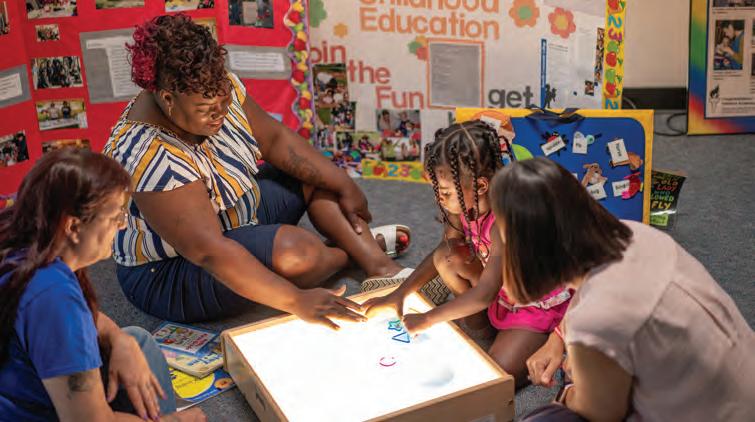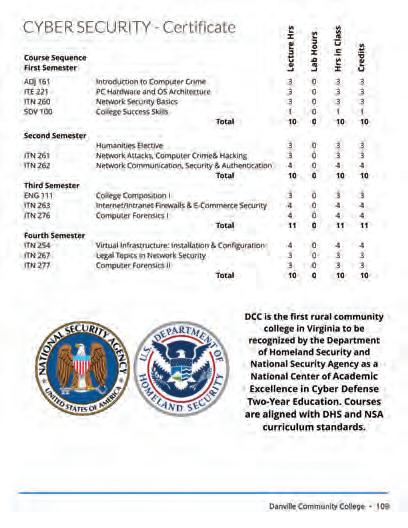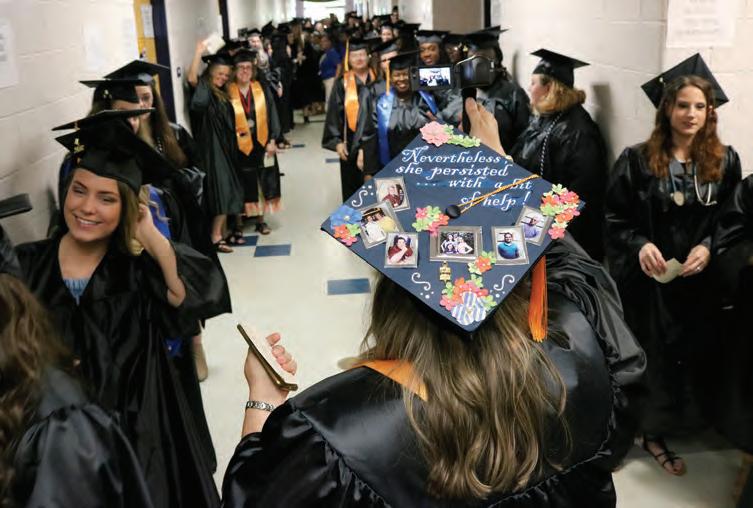
8 minute read
Education
DCC’s education programs span a wide range of age groups and careers. Graduates of the Associate in Applied Science and the Career Studies Certificates may seek immediate employment in daycare or elementary school settings as a teacher’s aide after graduation. Associate degree students may also choose to transfer to a four-year university to become a K-12 school teacher.
Advanced Early Childhood Development (CSC) ............................................................................................. 130 Early Childhood Development (CSC) .............................................................................................................. 131 Early Childhood Education (AAS).................................................................................................................... 132
Advertisement
Award: Career Studies Certificate
Plan Code: 221-636-10
CIP Code: 19.0709
PROGRAM INFO Minimum credits: 12 (28 total when combined with ALL courses in the Early Childhood Development CSC) Length: 1 semester (2 semesters when combined with This certificate is the second ALL courses in the Early Childhood Development CSC), step in a stackable path for if suggested full-time course sequence is followedEarly Childhood Educators. The Advanced Career Studies Career opportunities: Certificate in Early Childhood Realtime career outlook data Development prepares students to is available on each program page work with children from birth to age at danville.edu. 8 using developmentally appropriate practices. Coursework includes infant/ Division: Arts, Sciences, & Business toddler care and education, working Contact: 434.797.8402 or 434.797.8462 with exceptional children, developing partnerships with families and the community, and administration of Early Childhood Programs. This certificate is primarily designed to prepare graduates for employment in child care centers as lead teachers or directors or to allow students to continue on the path towards the AAS degree in Early Childhood Education.
Scholarships are available for this program, including the Virginia Child Care Providers scholarship, and the Project Pathfinders Scholarship.
Admission Requirements: In addition to regular college admission requirements, program entry requires a personal interview with the Early Childhood Education Department, as well as meeting the following criteria: 1. Excellent moral character is generally considered prerequisite for employment. 2. Upon program entrance, the student will be responsible for obtaining and paying for a criminal background check and show a negative TB test. 3. Students must possess sufficient physical strength, flexibility and dexterity to perform education and care routines for children.
The Early Childhood Department has made a commitment to the NAEYC Standards of ethical behavior in early childhood care and education. https://www.naeyc.org/sites/default/files/globally-shared/downloads/PDFs/resources/positionstatements/Ethics%20Position%20Statement2011_09202013update.pdf
Program Outcomes: Graduates will be able to: 1. Adhere to Virginia’s Standards for Licensed Child Day Centers in the planning and evaluation of classroom and learning environments to ensure the health, safety and nutrition of children. 2. Design and implement developmentally appropriate curriculum plans, to include learning activities and environments for children. 3. Engage in and support diverse family and community relationships to build enriching and effective partnerships for children.
Lecture Lab Hours Credits Hours Hours in Class
Course Sequence One Semester (when combined with ALL courses in the Early Childhood Development CSC) CHD 166 Infant and Toddler Programs 3 0 3 3 CHD 210 Introduction to Exceptional Children 3 0 3 3
CHD 216 Early Childhood Programs, Schools and Social Change 3 0 3 3
CHD 270 Administration of Childcare Programs 3 0 3 3 Total 12 0 12 12
G3Additional financial assistance might be available for G3 programs. Please contact your advisor or counselor for more information.
Award: Career Studies Certificate
Plan Code: 221-636-04
CIP Code: 19.0709
PROGRAM INFO Minimum credits: 16 Length: 1 semester, if suggested full-time course sequence is followed Career opportunities: This certificate is the first step Realtime career outlook data in a stackable path for Early is available on each program page Childhood Educators. The Career at danville.edu. Studies Certificate in Early Childhood Development prepares students for Division: Arts, Sciences, & Business entry level work with children from Contact: 434.797.8402 or 434.797.8462 birth to age 8 using developmentally appropriate practices. Coursework includes basic child development and theoretical perspectives, health and safety education, and guiding children’s behavior. This certificate is primarily designed to prepare graduates for employment in child care centers or family day homes as entry level providers or to allow students to continue on the path towards the Adv. CSC and/or AAS degree in Early Childhood Education.
Scholarships are available for this program, including the Virginia Child Care Providers scholarship, and the Project Pathfinders Scholarship.
Admission Requirements: In addition to regular college admission requirements, program entry requires a personal interview with the Early Childhood Education Department, as well as meeting the following criteria: 1. Excellent moral character is generally considered prerequisite for employment. 2. Upon program entrance, the student will be responsible for obtaining and paying for a criminal background check and show a negative TB test. 3. Students must possess sufficient physical strength, flexibility and dexterity to perform education and care routines for children.
The Early Childhood Department has made a commitment to the NAEYC Standards of ethical behavior in early childhood care and education. https://www.naeyc.org/sites/default/files/globally-shared/downloads/PDFs/resources/positionstatements/Ethics%20Position%20Statement2011_09202013update.pdf
Program Outcomes: Graduates will be able to: 1. Adhere to Virginia’s Standards for Licensed Child Day Centers in the planning & evaluation of classroom & learning environments to ensure the health, safety & nutrition of children. 2. Design and implement developmentally appropriate curriculum plans, to include learning activities and environments for children.
Lecture Lab Hours Credits Hours Hours in Class
Course Sequence SDV 100 College Success Skills CHD 120 Intro to Early Childhood Education CHD 145 Teaching Art, Music & Movement to Children CHD 165 Observation & Participation in Early Childhood/Primary Settings CHD 205 Guiding the Behavior of Children EDU 235 Health, Safety, & Nutrition Education 1 0 1 1 3 0 3 3 2 2 4 3
1 6 7 3 3 0 3 3 3 0 3 3 Total 13 8 21 16
Course sequence note: Students completing this CSC to satisfy Head Start regulations must take CHD 167 (CDA Theories and Applications: Portfolio).
G3Additional financial assistance might be available for G3 programs. Please contact your advisor or counselor for more information.
Award: Associate of Applied Science
Plan Code: 636
CIP Code: 19.0709
PROGRAM INFO Minimum credits: 62 Length: 2 years (4 semesters), if suggested full-time course sequence is followed This degree is the third step in a stackable path for Early Childhood Educators. This program prepares students to work with children from birth to age 8 using Career opportunities: Realtime career outlook data developmentally appropriate practices documented by is available on each program page Virginia Competencies for Early Childhood Professionals. at danville.edu. Coursework includes child education, behavior Division: Arts, Sciences, & Business management, methods of teaching children, general education, and electives. Instruction will include both Contact: 434.797.8402 or 434.797.8462 theoretical concepts and practical applications needed to provide high-quality services for children. The degree is primarily designed to prepare graduates for immediate employment after completion of DCC studies or to enable a student to seamlessly transfer to a four-year bachelor’s degree program in Early Childhood Education and teacher licensure Pre K-3. Please see the program coordinator for a list of Virginia Public Institutions that accept this degree for licensure and their criteria.
Scholarships are available for this program, including the Virginia Child Care Providers scholarship, and the Project Pathfinders Scholarship.
Instructional Delivery: About 2/3 of program courses are offered online or as hybrid courses to accommodate working professionals.
Admission Requirements: In addition to regular college admission requirements, program entry requires a personal interview with the Early Childhood Education Department, as well as meeting the following criteria: 1. Excellent moral character is generally considered prerequisite for employment. 2. Upon program entrance, the student will be responsible for obtaining and paying for a criminal background check and show a negative TB test. 3. Students must possess sufficient physical strength, flexibility and dexterity to perform education and care routines for children.
The Early Childhood Department has made a commitment to the NAEYC Standards of ethical behavior in early childhood care and education. https://www.naeyc.org/sites/default/files/globally-shared/downloads/PDFs/resources/positionstatements/Ethics%20Position%20Statement2011_09202013update.pdf
Program Outcomes: Graduates will be able to: 1. Adhere to Virginia’s Standards for Licensed Child Day Centers in the planning and evaluation of classroom and learning environments to ensure the health, safety and nutrition of children. 2. Design and implement developmentally appropriate curriculum plans, to include learning activities and environments for children. 3. Engage in and support diverse family and community relationships to build enriching and effective partnerships for children. 4. Observe, document and assess progress to promote positive outcomes for all children. 5. Engage with peers and community partners in the early childhood profession through collaborative learning and informed advocacy for young children.
Course Sequence FIRST SEMESTER SDV 100 College Success Skills CHD 120 Intro to Early Childhood Education CHD 145 Teaching Art, Music & Movement to Children CHD 165 Observation & Participation in Early Childhood/Primary Settings CHD 205 Guiding the Behavior of Children EDU 235 Health, Safety, & Nutrition Education
Total
SECOND SEMESTER CHD 166 Infant and Toddler Programs CHD 210 Introduction to Exceptional Children CHD 216 Early Childhood Programs, Schools and Social Change CHD 270 Administration of Childcare Programs ENG 111 College Composition II
Total
THIRD SEMESTER CHD 118 Language Arts for Young Children CHD 146 Math, Science, & Social Studies for Children PSY 230 Developmental Psychology BIO 101 General Biology I ENG 112 College Composition II
FOURTH SEMESTER MTH 154 Quantitative Reasoning CHD 265 Advanced Observation & Participation in Early Childhood/Primary Settings EDU 200 Intro to Teaching As a Profession ENG 250 Children’s Literature or Approved LIT Elective HIS 121 United States History I Total
Total
Continued from previous page
Lecture Lab Hours Credits Hours Hours in Class
1 0 1 1 3 0 3 3 2 2 4 3
1 6 7 3 3 0 3 3 3 0 3 3 13 8 21 16
3 0 3 3 3 0 3 3 3 0 3 3 3 0 3 3 3 0 3 3 15 0 15 15
2 2 4 3 2 2 4 3 3 0 3 3 3 3 6 4 3 0 3 3 13 7 20 16
3 0 3 3
1 6 7 3 3 0 3 3 3 0 3 3 3 0 3 3 13 6 19 15
G3Additional financial assistance might be available for G3 programs. Please contact your advisor or counselor for more information.







